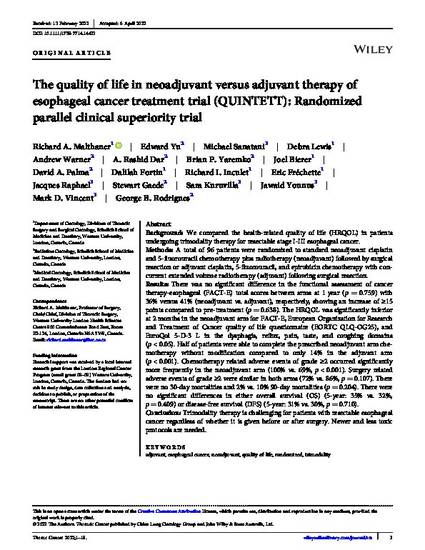
Article
The quality of life in neoadjuvant versus adjuvant therapy of esophageal cancer treatment trial (QUINTETT): Randomized parallel clinical superiority trial
Thorac Cancer
(2022)
Abstract
Background: We compared the health-related quality of life (HRQOL) in patients
undergoing trimodality therapy for resectable stage I-III esophageal cancer.
Methods: A total of 96 patients were randomized to standard neoadjuvant cisplatin
and 5-fluorouracil chemotherapy plus radiotherapy (neoadjuvant) followed by surgical
resection or adjuvant cisplatin, 5-fluorouracil, and epirubicin chemotherapy with concurrent
extended volume radiotherapy (adjuvant) following surgical resection.
Results: There was no significant difference in the functional assessment of cancer
therapy-esophageal (FACT-E) total scores between arms at 1 year (p = 0.759) with
36% versus 41% (neoadjuvant vs. adjuvant), respectively, showing an increase of ≥15
points compared to pre-treatment (p = 0.638). The HRQOL was significantly inferior
at 2 months in the neoadjuvant arm for FACT-E, European Organization for Research
and Treatment of Cancer quality of life questionnaire (EORTC QLQ-OG25), and
EuroQol 5-D-3 L in the dysphagia, reflux, pain, taste, and coughing domains
(p < 0.05). Half of patients were able to complete the prescribed neoadjuvant arm chemotherapy
without modification compared to only 14% in the adjuvant arm
(p < 0.001). Chemotherapy related adverse events of grade ≥2 occurred significantly
more frequently in the neoadjuvant arm (100% vs. 69%, p < 0.001). Surgery related
adverse events of grade ≥2 were similar in both arms (72% vs. 86%, p = 0.107). There
were no 30-day mortalities and 2% vs. 10% 90-day mortalities (p = 0.204). There were
no significant differences in either overall survival (OS) (5-year: 35% vs. 32%,
p = 0.409) or disease-free survival (DFS) (5-year: 31% vs. 30%, p = 0.710).
Conclusion: Trimodality therapy is challenging for patients with resectable esophageal
cancer regardless of whether it is given before or after surgery. Newer and less toxic
protocols are needed.
Keywords
- adjuvant,
- esophageal cancer,
- neoadjuvant,
- quality of life,
- randomized,
- trimodality
Disciplines
Publication Date
Spring April 6, 2022
DOI
10.1111/1759-7714.14433
Publisher Statement
Open access
Citation Information
Richard A. Malthaner, Edward Yu, Michael Sanatani, Debra Lewis, et al.. "The quality of life in neoadjuvant versus adjuvant therapy of esophageal cancer treatment trial (QUINTETT): Randomized parallel clinical superiority trial" Thorac Cancer (2022) p. 1 - 18 Available at: http://works.bepress.com/edwardyu/119/
